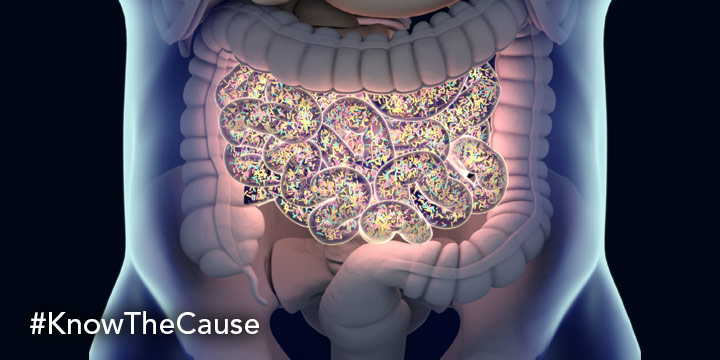

The human digestive system plays a critical role in keeping out toxic and allergenic chemicals out of the bloodstream by a maintaining the “gut-blood barrier”. This barrier is composed mostly of intestinal epithelial cells and tight junction proteins that exist between them- along with a layer of protective glycoproteins called mucins. Disruptions of the “gut-blood barrier” can cause “leaky gut syndrome which can allow toxins and undigested allergenic proteins to enter the bloodstream. This leaky gut syndrome is believed to be related to many chronic diseases including asthma, chronic fatigue, food allergy/ intolerance, rheumatoid arthritis, inflammatory bowel disease, autism, dementia, and other autoimmune diseases (1). Eating probiotic bacteria and/or the fatty phospholipid lecithin has been associated with stronger gut barriers and lower levels of leaky gut related health symptoms (2).
Various studies have suggested that exposure to mycotoxins and/or the common intestinal fungi Candida are associated with significantly worse gut barrier function (3, 4). Common foodborne mycotoxins include deoxynivalenol (DON or vomittoxin), aflatoxins, ochratoxins, and zearalenone. Mycotoxins primarily damage the intestinal cells by causing DNA and oxidative damage (3). Mycotoxins can also damage the mucin barrier of the intestines. Gut mycotoxins can also reduce populations of beneficial bacteria like Lactobacillus (3).
Heavy intestinal Candida growth can also reduce gut barriers. Various leaky gut experimental models have shown that heavy Candida intestinal growth can stimulate IL-9 (Interleukin-9) and intestinal mucosa mast cells and cause leaky gut, inflammation, and diarrhea (4).
Much More Research on Candida and the Leaky Gut Syndrome is needed.
Resources/References
Doug Kaufmann has written many books that cover a full range or health issues. Find out which of his books best suits you by clicking the button below.
Doug Kaufmann developed his diet after years studying the clinical effects of pathogenic fungi on the body. Fungi and yeasts can become parasitic organisms on and inside our body, causing health problems that can be difficult to diagnose. Learn more about the Kaufmann Diet, change your life and know the cause.
We encourage all visitors to take some time and study these technical articles prior to initiating lifestyle changes, including dietary changes and to do so with their physician’s awareness and approval. The articles posted in this link are scientific and with few exceptions are taken from medical journals familiar to healthcare workers.
Looking for help assembling antifungal Kaufmann Diet approved recipes for breakfast, lunch or dinner? We have several videos, books and recipe write ups here on Know the Cause that will help your health journey. The recipes in this section are so good, you’ll feel like you’re indulging. No sacrifice needed! Enjoy.
© 2025 Mediatriton Inc. All Rights Reserved • Website by Skynet Solutions